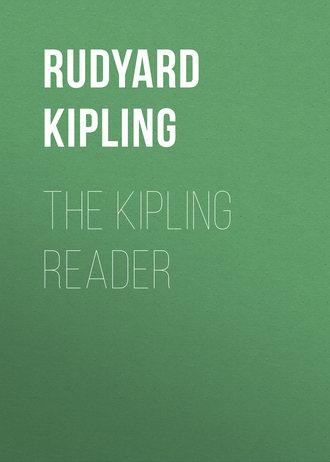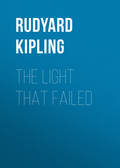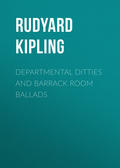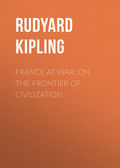
Редьярд Джозеф Киплинг
The Kipling Reader
POETRY
THE NATIVE-BORN
_We've drunk to the Queen – God bless her! —
We've drunk, to our mothers' land;
We've drunk to our English brother
(But he does not understand);
We've drunk to the wide creation,
And the Cross swings low for the morn;
Last toast, and of obligation,
A health to the Native-born!
They change their skies above them,
But not their hearts that roam!
We learned from our wistful mothers
To call old England 'home';
We read of the English skylark,
Of the spring in the English lanes,
But we screamed with the painted lories
As we rode on the dusty plains!
They passed with their old-world legends —
Their tales of wrong and dearth —
Our fathers held by purchase,
But we by the right of birth;
Our heart's where they rocked our cradle,
Our love where we spent our toil,
And our faith and our hope and our honour
We pledge, to our native soil!
I charge you charge your glasses —
I charge you drink with me
To the men of the Four New Nations,
And the Islands of the Sea —
To the last least lump of coral
That none may stand outside,
And our own good pride shall teach us
To praise our comrade's pride!_
To the hush of the breathless morning
Oh the thin, tin, crackling roofs,
To the haze of the burned back-ranges
And the dust of the shoeless hoofs —
To the risk of a death by drowning,
To the risk of a death by drouth —
To the men of a million acres,
To the Sons of the Golden South!
To the Sons of the Golden South (Stand up!),
And the life we live and know,
Let a fellow sing o' the little things he cares about,
If a fellow fights for the little things he cares about
With the weight of a single blow!
To the smoke of a hundred coasters,
To the sheep on a thousand hills,
To the sun that never blisters,
To the rain that never chills —
To the land of the waiting spring-time,
To our five-meal, meat-fed men,
To the tall, deep-bosomed women,
And the children nine and ten!
And the children nine and ten (Stand up!),
And the life we live and know,
Let a fellow sing o' the little things he cares about,
If a fellow fights for the little things he cares about
With the weight of a two-fold blow!
To the far-flung fenceless prairie
Where the quick cloud-shadows trail,
To our neighbour's barn in the offing
And the line of the new-cut rail;
To the plough in her league-long furrow
With the gray Lake gulls behind —
To the weight of a half-year's winter
And the warm wet western wind!
To the home of the floods and thunder,
To her pale dry healing blue —
To the lift of the great Cape combers,
And the smell of the baked Karroo.
To the growl of the sluicing stamp-head —
To the reef and the water-gold,
To the last and the largest Empire,
To the map that is half unrolled!
To our dear dark foster-mothers,
To the heathen songs they sung —
To the heathen speech we babbled
Ere we came to the white man's tongue.
To the cool of our deep verandas —
To the blaze of our jewelled main,
To the night, to the palms in the moonlight,
And the fire-fly in the cane!
To the hearth of our people's people —
To her well-ploughed windy sea,
To the hush of our dread high-altar
Where The Abbey makes us We;
To the grist of the slow-ground ages,
To the gain that is yours and mine —
To the Bank of the Open Credit,
To the Power-house of the Line!
We've drunk to the Queen – God bless her! —
We've drunk to our mothers' land;
We've drunk to our English brother
(And we hope he'll understand).
We've drunk as much as we're able,
And the Cross swings low for the morn;
Last toast – and your foot on the table! —
A health to the Native-born!
A health to the Native-torn (Stand up!),
We're six white men mow,
All bound to sing o' the little things we care about,
All bound to fight for the little things we care about
With the weight of a six-fold blow!
By the might of our cable-tow (Take hands!),
From the Orkneys to the Horn,
All round the world (and a little loop to pull it by),
All round the world (and a little strap to buckle it),
A health to the Native-born!
THE FLOWERS
To our private taste, there is always something a little exotic, almost artificial, in songs which, under an English aspect and dress, are yet so manifestly the product of other skies. They affect us like translations; the very fauna and flora are alien, remote; the dog's-tooth violet is but an ill substitute for the rathe primrose, nor can we ever believe that the wood-robin sings as sweetly in April as the English thrush. – THE ATHENÆUM.
Buy my English posies!
Kent and Surrey may —
Violets of the Undercliff
Wet with Channel spray;
Cowslips from a Devon combe —
Midland furze afire —
Buy my English posies
And I'll sell your heart's desire!
Buy my English posies!
You that scorn the May,
Won't you greet a friend from home
Half the world away?
Green against the draggled drift,
Faint and frail and first —
Buy my Northern blood-root
And I'll know where you were nursed:
Robin down the logging-road whistles, Come to me!'
Spring has found the maple-grove, the sap is running free;
All the winds of Canada call the ploughing-rain.
Take the flower and turn the hour, and kiss your love again!
Buy my English posies!
Here's to match your need —
Buy a tuft of royal heath,
Buy a bunch of weed
White as sand of Muysenberg
Spun before the gale —
Buy my heath and lilies
And I'll tell you whence you hail!
Under hot Constantia broad the vineyards lie —
Throned and thorned the aching berg props the speckless sky —
Slow below the Wynberg firs trails the tilted wain —
Take the flower arid turn the hour, and kiss your love again!
Buy my English posies!
You that will not turn —
Buy my hot-wood clematis.
Buy a frond o' fern
Gathered where the Erskine leaps
Down the road to Lorne —
Buy my Christmas creeper
And I'll say where you were born!
West away from Melbourne dust holidays begin —
They that mock at Paradise woo at Cora Lynn —
Through the great South Otway gums sings the great South Main —
Take the flower and turn the hour, and kiss your love again!
Buy my English posies!
Here's your choice unsold!
Buy a blood-red myrtle-bloom,
Buy the kowhai's gold
Flung for gift on Taupo's face,
Sign that spring is come —
Buy my clinging myrtle
And I'll give you back your home!
Broom behind the windy town; pollen o' the pine —
Bell-bird in the leafy deep where the ratas twine —
Fern above the saddle-bow, flax upon the plain —
Take the flower and turn the hour, and kiss your love again!
Buy my English posies!
Ye that have your own,
Buy them for a brother's sake
Overseas, alone.
Weed ye trample underfoot
Floods his heart abrim —
Bird ye never heeded,
Oh, she calls his dead to him!
Far and far our homes are set round the Seven Seas;
Woe for us if we forget, we that hold by these!
Unto each his mother-beach, bloom and bird and land —
Masters of the Seven Seas, oh, love and understand.
MUNICIPAL
"Why is my District death-rate low?"
Said Binks of Hezabad.
"Wells, drains, and sewage-outfalls are
My own peculiar fad.
I learnt a lesson once. It ran
Thus," quoth that most veracious man: —
It was an August evening and, in snowy garments clad,
I paid a round of visits in the lines of Hezabad;
When, presently, my Waler saw, and did not like at all,
A Commissariat elephant careering down the Mall.
I couldn't see the driver, and across my mind it rushed
That that Commissariat elephant had suddenly gone musth.
I didn't care to meet him, and I couldn't well get down,
So I let the Waler have it, and we headed for the town.
The buggy was a new one and, praise Dykes, it stood the strain,
Till the Waler jumped a bullock just above the City Drain;
And the next that I remember was a hurricane of squeals,
And the creature making toothpicks of my five-foot patent wheels.
He seemed to want the owner, so I fled, distraught with fear,
To the Main Drain sewage outfall while he snorted in my ear —
Reached the four-foot drain-head safely and, in darkness and despair,
Felt the brute's proboscis fingering my terror-stiffened hair,
Heard it trumpet on my shoulder – tried to crawl a little higher —
Found the Main Drain sewage-outfall blocked some eight feet up,
with mire;
And, for twenty reeking minutes, Sir, my very marrow froze,
While the trunk was feeling blindly for a purchase on my toes!
It missed me by a fraction, but my hair was turning grey
Before they called the drivers up arid dragged the brute away.
Then I sought the City Elders, and my words were very plain.
They flushed that four-foot drain-head and – it never choked again.
You may hold with surface-drainage, and the sun-for-garbage cure, Till you've been a periwinkle shrinking coyly up a sewer. I believe in well-flushed culverts … This is why the death-rate's small; And, if you don't believe me, get shikarred yourself. That's all.
THE COASTWISE LIGHTS
Our brows are bound with spindrift and the weed is on our knees;
Our loins are battered 'neath us by the swinging, smoking seas.
From reef and rock and skerry – over headland, ness, and voe —
The Coastwise Lights of England watch the ships of England go!
Through the endless summer evenings, on the lineless, level floors;
Through the yelling Channel tempest when the siren hoots and roars —
By day the dipping house-flag and by night the rocket's trail —
As the sheep that graze behind us so we know them where they hail.
We bridge across the dark, and bid the helmsman have a care,
The flash that wheeling inland wakes his sleeping wife to prayer;
From our vexed eyries, head to gale, we bind in burning chains
The lover from the sea-rim drawn – his love in English lanes.
We greet the clippers wing-and-wing that race the Southern wool;
We warn the crawling cargo tanks of Bremen, Leith, and Hull;
To each and all our equal lamp at peril of the sea —
The white wall-sided war-ships or the whalers of Dundee!
Come up, come in from Eastward, from the guard-ports of the Morn!
Beat up, beat in from Southerly, O gipsies of the Horn!
Swift shuttles of an Empire's loom that weave us, main to main,
The Coastwise Lights of England give you welcome back again!
Go, get you gone up-Channel with the sea-crust on your plates;
Go, get you into London with the burden of your freights!
Haste, for they talk of Empire there, and say, if any seek,
The Lights of England sent you and by silence shall ye speak.
THE ENGLISH FLAG
Above the portico a flag-staff, bearing the Union Jack, remained fluttering in the flames for some time, but ultimately when it fell the crowds rent the air with shouts, and seemed to see significance in the incident. – DAILY PAPERS.
Winds of the World, give answer! They are whimpering to and fro —
And what should they know of England who only England know? —
The poor little street-bred people that vapour and fume and brag,
They are lifting their heads in the stillness to yelp at the English
Flag!
Must we borrow a clout from the Boer – to plaster anew with dirt?
An Irish liar's bandage, or an English coward's shirt?
We may not speak of England; her Flag's to sell or share.
What is the Flag of England? Winds of the World, declare!
The North Wind blew: – 'From Bergen my steel-shod vanguards go;
I chase your lazy whalers home from the Disko floe;
By the great North Lights above me I work the will of God,
And the liner splits on the ice-field or the Dogger fills with cod.
'I barred my gates with iron, I shuttered my doors with flame,
Because to force my ramparts your nutshell navies came;
I took the sun from their presence, I cut them down with my blast,
And they died, but the Flag of England blew free ere the spirit
passed.
'The lean white bear hath seen it in the long, long Arctic night,
The musk-ox knows the standard that flouts the Northern Light:
What is the Flag of England? Ye have but my bergs to dare,
Ye have but my drifts to conquer. Go forth, for it is there!'
The South Wind sighed: – 'From the Virgins my mid-sea course was ta'en
Over a thousand islands lost in an idle main,
Where the sea-egg flames on the coral and the long-backed breakers
croon
Their endless ocean legends to the lazy, locked lagoon.
'Strayed amid lonely islets, mazed amid outer keys,
I waked the palms to laughter – I tossed the scud in the breeze —
Never was isle so little, never was sea so lone,
But over the scud and the palm-trees an English flag was flown.
'I have wrenched it free from the halliard to hang for a wisp on the
Horn;
I have chased it north to the Lizard – ribboned and rolled and torn;
I have spread its fold o'er the dying, adrift in a hopeless sea;
I have hurled it swift on the slaver, and seen the slave set free.
'My basking sunfish know it, and wheeling albatross,
Where the lone wave fills with fire beneath the Southern Cross.
What is the Flag of England? Ye have but my reefs to dare,
Ye have but my seas to furrow. Go forth, for it is there!
The East Wind roared: – 'From the Kuriles, the Bitter Seas,
I come, And me men call the Home-Wind, for I bring the English home.
Look – look well to your shipping! By the breath of my mad typhoon
I swept your close-packed Praya and beached your best at Kowloon!
'The reeling junks behind me and the racing seas before,
I raped your richest roadstead – I plundered Singapore!
I set my hand on the Hoogli; as a hooded snake she rose,
And I flung your stoutest steamers to roost with the startled crows.
'Never the lotus closes, never the wild-fowl wake,
But a soul goes out on the East Wind that died for England's sake —
Man or woman or suckling, mother or bride or maid —
Because on the bones of the English the English Flag is stayed.
'The desert-dust hath dimmed it, the flying wild-ass knows,
The scared white leopard winds it across the taintless snows.
What is the Flag of England? Ye have but my sun to dare,
Ye have but my sands to travel. Go forth, for it is there!'
The West Wind called: – 'In squadrons the thoughtless galleons fly
That bear the wheat and cattle lest street-bred people die.
They make my might their porter, they make my house their path,
Till I loose my neck from their rudder and whelm them all in my
wrath.
'I draw the gliding fog-bank as a snake is drawn from the hole,
They bellow one to the other, the frighted ship-bells toll,
For day is a drifting terror till I raise the shroud with my breath,
And they see strange bows above them and the two go locked to death.
'But whether in calm or wrack-wreath, whether by dark or day,
I heave them whole to the conger or rip their plates away,
First of the scattered legions, under a shrieking sky,
Dipping between the rollers, the English Flag goes by.
'The dead dumb fog hath wrapped it – the frozen dews have kissed —
The naked stars have seen it, the fellow-star in the mist.
What is the Flag of England? Ye have but my breath to dare,
Ye have but my waves to conquer. Go forth, for it is there!'
ENGLAND'S ANSWER
Truly ye come of The Blood; slower to bless than to ban;
Little used to lie down at the bidding of any man.
Flesh of the flesh that I bred, bone of the bone that I bare;
Stark as your sons shall be – stern as your fathers were.
Deeper than speech our love, stronger than life our tether,
But we do not fall on the neck nor kiss when we come together.
My arm is nothing weak, my strength is not gone by;
Sons, I have borne many sons, but my breasts are not dry,
Look, I have made ye a place and opened wide the doors,
That ye may talk together, your Barons and Councillors —
Wards of the Outer March, Lords of the Lower Seas,
Ay, talk to your gray mother that bore you on her knees! —
That ye may talk together, brother to brother's face —
Thus for the good of your peoples – thus for the Pride of the Race.
Also, we will make promise. So long as The Blood endures,
I shall know that your good is mine: ye shall feel that my strength
is yours:
In the day of Armageddon, at the last great fight of all,
That Our House stand together and the pillars do not fall.
Draw now the threefold knot firm on the ninefold bands,
And the Law that ye make shall be law after the rule of your lands.
This for the waxen Heath, and that for the Wattle-bloom,
This for the Maple-leaf, and that for the southern Broom.
The Law that ye make shall be law and I do not press my will,
Because ye are Sons of The Blood and call me Mother still.
Now must ye speak to your kinsmen and they must speak to you,
After the use of the English, in straight-flung words and few.
Go to your work and be strong, halting not in your ways,
Balking the end half-won for an instant dole of praise.
Stand to your work and be wise – certain of sword and pen,
Who are neither children nor Gods, but men in a world of men!
THE OVERLAND MAIL
[FOOT-SERVICE TO THE HILLS]
In the name of the Empress of India, make way,
O Lords of the Jungle, wherever you roam,
The woods are astir at the close of the day
– We exiles are waiting for letters from Home.
Let the robber retreat – let the tiger turn tail —
In the Name of the Empress, the Overland Mail!
With a jingle of bells as the dusk gathers in,
He turns to the foot-path that heads up the hill —
The bags on his back and a cloth round his chin,
And, tucked in his waistbelt, the Post Office bill; —
'Despatched on this date, as received by the rail,
'Per runner, two bags of the Overland Mail.'
Is the torrent in spate? He must ford it or swim.
Has the rain wrecked the road? He must climb by the cliff.
Does the tempest cry 'halt'? What are tempests to him?
The service admits not a 'but' or an 'if.'
While the breath's in his mouth, he must bear without fail,
In the Name of the Empress, the Overland Mail.
From aloe to rose-oak, from rose-oak to fir,
From level to upland, from upland to crest,
From rice-field to rock-ridge, from rock-ridge to spur,
Fly the soft-sandalled feet, strains the brawny brown chest.
From rail to ravine – to the peak from the vale —
Up, up through the night goes the Overland Mail.
There's a speck on the hill-side, a dot on the road —
A jingle of bells on the foot-path below —
There's a scuffle above in the monkey's abode —
The world is awake and the clouds are aglow.
For the great Sun himself must attend to the hail:
– 'In the Name of the Empress, the Overland Mail!'
IN SPRING TIME
My garden blazes brightly with the rose-bush and the peach,
And the köil sings above it, in the siris by the well,
From the creeper-covered trellis comes the squirrel's chattering
speech,
And the blue jay screams and flutters where the cheery satbhai
dwell.
But the rose has lost its fragrance, and the köil's note is
strange;
I am sick of endless sunshine, sick of blossom-burdened bough.
Give me back the leafless woodlands where the winds of Springtime
range —
Give me back one day in England, for it's Spring in England now!
Through the pines the gusts are booming, o'er the brown fields
blowing chill,
From the furrow of the plough-share streams the fragrance of the
loam,
And the hawk nests on the cliffside and the jackdaw in the hill,
And my heart is back in England 'mid the sights and sounds of Home.
But the garland of the sacrifice this wealth of rose and peach is,
Ah! köil, little köil, singing on the siris bough,
In my ears the knell of exile your ceaseless bell-like speech is —
Can you tell me aught of England or of Spring in England now?






